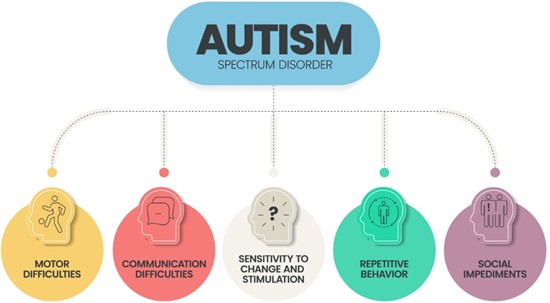A nurse in a special education program is planning care for a child who has an autism spectrum disorder.
Which of the following interventions should the nurse include in the plan of care?
Allow for imaginative play with peers without supervision.
Establish a reward system for positive behavior.
Provide a flexible schedule that adjusts to the child's interests.
Allow for adjustment of rules to correlate with the child's behavior.
The Correct Answer is B
Behavioral approaches have the most evidence for treating symptoms of Autism
Spectrum Disorder (ASD)1.
Applied Behavior Analysis (ABA) is a notable behavioral treatment for people with ASD that encourages desired behaviors and discourages undesired behaviors to improve a variety of skills.
A reward system for positive behavior is an example of an ABA technique.
Choice A is not correct because allowing for imaginative play with peers without supervision is not a recommended intervention for a child with ASD.
Choice C is not correct because providing a flexible schedule that adjusts to the child’s interests is not a recommended intervention for a child with ASD.
Choice D is not correct because allowing for adjustment of rules to correlate with the child’s behavior is not a recommended intervention for a child with ASD.

Nursing Test Bank
Naxlex Comprehensive Predictor Exams
Related Questions
Correct Answer is A
Explanation
The correct answer is Choice A.
Choice A rationale: The initial step in assessing unexplained bruising in a toddler is to gather information directly from the caregivers. This establishes a clinical baseline and allows the nurse to evaluate consistency, plausibility, and emotional responses. Bruising in toddlers can be developmental due to increased mobility, but patterns, location, and frequency matter. Normal platelet count ranges from 150,000 to 450,000/mm³; abnormal bruising may suggest thrombocytopenia, coagulopathy, or trauma. Early dialogue supports accurate documentation and escalation if needed.
Choice B rationale: While engaging the toddler may seem appropriate, their developmental stage limits reliable verbal communication. Toddlers typically lack the cognitive and linguistic capacity to describe events accurately, especially those involving trauma or abuse. Their responses may be influenced by fear, confusion, or limited vocabulary. Relying on their account prematurely risks misinterpretation and emotional distress. Assessment should prioritize adult sources first, followed by observational and clinical data to guide further action.
Choice C rationale: Notifying social services is a critical step in suspected abuse but must follow preliminary assessment and documentation. Premature reporting without context may lead to unnecessary distress for the family and compromise the integrity of the investigation. The nurse must first gather objective findings, caregiver explanations, and clinical indicators. Social services involvement is warranted when findings suggest non-accidental trauma, inconsistent histories, or high-risk environments. The decision must be evidence-informed and procedurally sound.
Choice D rationale: Notifying the provider is essential for collaborative care but should follow initial data collection. The provider relies on the nurse’s observations and caregiver input to determine next steps, including diagnostic testing or referral. Immediate escalation without context may delay appropriate triage or misdirect resources. The nurse’s role includes thorough documentation, pattern recognition, and initiating dialogue with caregivers to inform the provider’s clinical judgment. This ensures a coordinated, evidence-based response.
Correct Answer is A
Explanation
Isotretinoin has been associated with depression and other psychiatric side effects.
The client should report any changes in mood or behavior, including feelings of isolation, to the provider immediately.
Choice B is not an answer because while frequent nosebleeds can be a side
effect of isotretinoin, it is not the priority to report to the provider.
Choice C is not an answer because while back pain can be a side effect of isotretinoin, it is not the priority to report to the provider.
Choice D is not an answer because while itching of the skin can be a side effect of isotretinoin, it is not the priority to report to the provider.
Whether you are a student looking to ace your exams or a practicing nurse seeking to enhance your expertise , our nursing education contents will empower you with the confidence and competence to make a difference in the lives of patients and become a respected leader in the healthcare field.
Visit Naxlex, invest in your future and unlock endless possibilities with our unparalleled nursing education contents today
Report Wrong Answer on the Current Question
Do you disagree with the answer? If yes, what is your expected answer? Explain.
Kindly be descriptive with the issue you are facing.
